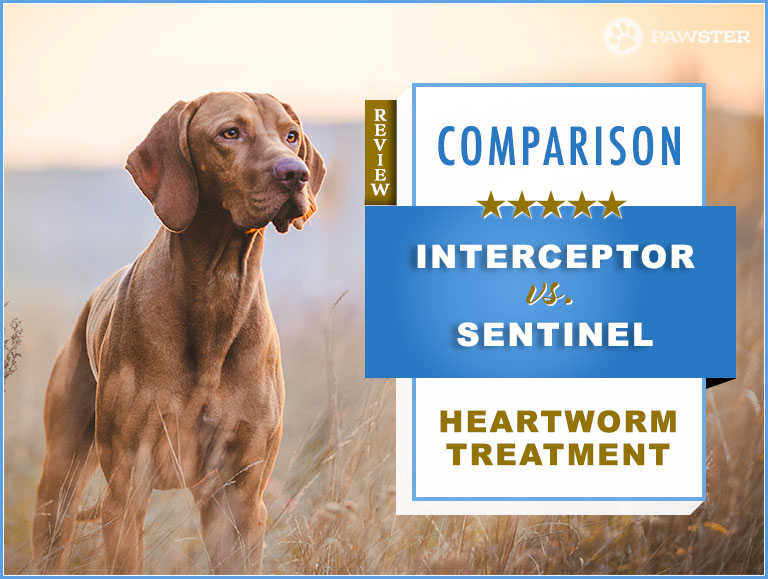Interceptor vs. Sentinel : Comparison and Key Differences

Contents of Article
- Which is Better Interceptor or Sentinel for Dogs?
- Which is Better Interceptor or Sentinel for Cats?
- Our Review of Interceptor and Sentinel
- Key Differences Between Interceptor and Sentinel
- Interceptor and Sentinel Active Ingredients Comparison
- Which Treatment is the Best Priced?
- Which Do We Recommend?
- 7 Treatment Application Tips
- Final Thoughts
Heartworm is a dangerous parasite that can ruin your pet’s quality of life and even lead to death. The good news is that heartworm is entirely preventable, and vets have little issue prescribing preventative treatments.
Vets know that the trick to beating heartworm is never contracting it. Interceptor and Sentinel are powerful preventative treatments designed to be your pets first line of defense against heartworm and a host of other parasites.
Which is Better Interceptor or Sentinel for Dogs?
Sentinel is trusted by veterinarians and pet owners alike for its wide spectrum parasitic protection. Sentinel flavor tablets for dogs provides monthly protection from heartworms, hookworms, roundworms whipworms, and fleas.
Flea treatments for dogs are often sold separate form heartworm treatments.
We recommend Sentinel for dogs for the added protection from fleas. When compared to Interceptor, Sentinel not only provides a wider range of parasitic protection but eliminates the need to purchase secondary flea protection.
Which is Better Interceptor or Sentinel for Cats?
Felines do not often contract heartworm. Heartworm is rare in cats because Feline physiology cannot support an infestation of more than three heartworms past the adolescent stage.
Since the feline infesting heartworms do not mature, they cannot reproduce and spread. Many vets recommend monitoring your cat through the lifespan of the worms, in lieu of expensive surgery.
Feline heartworm may be rare, but feline adulticide therapy does not exist. If your cat contracts heartworm, they can be in serious trouble. Surgery is highly invasive and not always successful.
Therefore, we recommend inoculating your cat from the danger of heartworm with Interceptor. Sentinel is not approved for feline application.
Our Review of Interceptor and Sentinel
When vets reach for parasite protection, they reach for Interceptor or Sentinel preventative treatments.
Which is the best for your pet? We’ll let your vet answer that question. Here are the unbiased facts to help you feel more informed when you decide on the best preventive treatment for your pet.
Key Differences Between Interceptor and Sentinel
Interceptor and Sentinel are broad-spectrum parasitic preventative treatments for dogs (and cats.)
When delivered monthly, Interceptor and Sentinel claim to provide your pet with more than protection.
Each brand claims to provide peace-of-mind and come with the recommendation of veterinarians and pet owners.
Interceptor
Interceptor is a well trusted parasitic preventive treatment primarily utilized to prevent heartworm, but also effective against roundworms, hookworms, and whipworms.
Interceptor is only available via veterinarian prescription, but administering Interceptor is easy.
It comes in a chicken-flavored chewable tablet. Simply hide the tablet in your pet’s food or administer orally and Interceptor provides wide-spectrum defense against the most dangerous parasitic worms.
Sentinel
Sentinel, like Interceptor, is a prescribed, once a month parasitic preventive treatment for dogs.
Sentinel is highly recommended by vets who appreciate its broad-range of parasitic protection which includes heartworms, roundworms, hookworms, whipworms, and even fleas.
Interceptor and Sentinel are two of the most trusted brands in parasitic prevention.
However, like all heavy-hitters they have different strengths and weaknesses, starting with the range of their parasitic protection.
Parasitic Protection
Your pet’s well-being depends on a solid defense against the parasites that can sap years of longevity from your pet.
Interceptor and Sentinel both provide broad-spectrum parasite protection from heartworms, roundworms, whipworms, and hookworms. However, Sentinel includes added protection for fleas.
The added protection does not only provide another layer of parasitic prevention, but it also eliminates the need to purchase a secondary preventive treatment.
Packaging & Applications
Interceptor and Sentinel are both packaged according to the size of the dosage. Dosages are determined by the body weight of the intended pet.
Each brand conveniently color codes each package according to dose, and body weight and includes six doses and options for extra small, small, medium, and large dogs.
Sentinel does not have any feline applications. Interceptor, on the other hand, includes two options for cats:
Interceptor Tablets for Dogs 11-25 lbs & Cats 1.5-6 lbs
Interceptor Tablets for Dogs 26-50 lbs & Cats 6.1-12 lbs
Interceptor and Sentinel Active Ingredients Comparison
The active ingredients in Sentinel and Interceptor are primarily designed to neutralize and eliminate parasitic worm infestations in your pet, specifically heartworm.
Parasitic worms, like heartworms, roundworms, hookworms, and whipworms are internal parasites. Internal parasites require a different compound of active ingredients to combat than external parasites, such as fleas and ticks.
Sentinel provides additional protection from fleas and therefore utilizes a different compound of active ingredients than Interceptor.
Interceptor: Milbemycin Oxime & Praziquantel
Interceptor protects against heartworms, roundworms, hookworms, and whipworms via a combination of milbemycin oxime and praziquantel which neutralize adult worms and prevent new infestations from occurring.
Milbemycin oxime is a broad spectrum antiparasitic utilized around the world in various medications to prevents against worms and mites.
Praziquantel is a medication designed to treat parasitic worm infections. Praziquantel is very effective considered by the World Health Organization to be an essential medicine in any health system.
Sentinel: Milbemycin Oxime & Lufenuron
Like Interceptor, Sentinel utilizes milbemycin oxime as its active ingredient to eliminate and prevent infestation of heartworms, roundworms, hookworms, and whipworms.
However, Sentinel also utilizes lufenuron to kill adult fleas and prevent reinfestation. Lufenuron is a benzoylurea pesticide that stunts a flea’s development, preventing them from maturing and reproducing.
Which Treatment is the Best Priced?
Individual packages of Interceptor are slightly more affordable than Sentinel and available for feline application.
- Interceptor Tablets for Dogs 11-25 lbs & Cats 1.5-6 lbs – $30.13
- Interceptor Tablets for Dogs 26-50 lbs & Cats 6.1-12 lbs – $31.05
- Interceptor Tablets for Dogs 26-50 lbs – $35.62
- Interceptor Tablets for Dogs 51-100 lbs – $43.84
However, Sentinel provides additional protection from fleas, which eliminates the cost of additional flea treatment, approximately $25-$85.
- Sentinel Flavor Tablets for Dogs, under 10 lbs – $42.24
- Sentinel Flavor Tablets for Dogs, 11-25 lbs -$44.16
- Sentinel Flavor Tablets for Dogs, 26-50 lbs – $52.80
- Sentinel Flavor Tablets for Dogs, 51-100 lbs – $63.84
Which Do We Recommend?
We think it is vitally important to the wellbeing of your pet that they are inoculated from the threat of parasitic infection.
Heartworm (Dirofilaria immitis) is easily contracted from the bite of an infected mosquito and can be devastating to your pets internal organs, and fatal if left untreated.
Dogs are the natural host to heartworm and many parasitic worms, but felines are not immune.
Sentinel is not approved for feline application. Therefore, we recommend Interceptor for preventative heartworm treatments for cats.
However, we also firmly believe in providing the widest range of protection we can for our pets. Dogs need all of the parasitic protection we can give them which is why we recommend Sentinel for dogs.
Though more expensive, we can’t help but agree with veterinarians who recommend providing dogs with a wide range of parasitic protection.
7 Treatment Application Tips
We always recommend consulting your vet before administering any treatment.
However, when it comes to chewable treatments, we have a few tips that can make the entire experience less stressful for your pet.
For Dogs:
- Hyper dogs are incredibly fun and affectionate, but they can also make it incredibly hard to administer their treatment.
For hyper dogs, we recommend a long walk, trip to the park or some vigorous playtime before administering treatment.
- Interceptor and Sentinel include many of the same ingredients. Therefore, they include many of the same side effects, including vomiting, depression/lethargy, pruritus, urticaria, diarrhea, anorexia, skin congestion, ataxia, convulsions, hypersalivation, and weakness.
If you notice that your pet vomits or develops diarrhea, we recommend monitoring them after each application to ensure treatment retention.
However, if your pet develops, or shows signs of any of the other symptoms we highly recommend contacting your bet before administering further treatment.
- The best way to administer chewable treatments like Interceptor and Sentinel is to conceal the tablet in a treat or within their food.
This tip may seem simple and intuitive, but it can be harder to accomplish than you think, and common for dogs to refuse Interceptor and Sentinel tablets.
For Cats:
- Cats are finicky by nature, and also rather sharp. The easiest way to administer a chewable treatment to a cat is to conceal it in pill pockets, or pill paste which are a tastier and less obvious way to conceal and administer the treatment.
- Cats do not like being watched and are less likely to ingest their food, or their treatment if it is obvious that you are watching them eat.
We recommend concealing the treatment in their food and stepping out of sight. Check in periodically to ensure they have ingested the treatment.
- If your cat doesn’t eat the treatment, administering the treatment orally may be your only option. Use a fluffy towel to pick up your cat carefully. Then use your hands or to administer the treatment orally and do your best to avoid their claws.
If your cat is having trouble swallowing the treatment, break it up and chase the treatment with the syringe of water.
- Cats can tell when you are nervous. The best way to orally administer treatment to a nervous cat is to remain calm yourself.
Final Thoughts
Parasites are incredibly dangerous to your pets, and few are as dangerous as heartworm. Your pet can contract heartworm from a simple mosquito bight.
From there the worms spread to devastate the heart and other internal organs. The best way to protect your pet from the damages of a parasitic infection is to prevent the infection from ever occurring.
Interceptor and Sentinel are safe for use on dogs as little as four weeks, and we can recommend inoculating your dog as early as possible.
For cats we recommend Interceptor. However, we love the additional protection from fleas that Sentinel provides to dogs.
Fleas may not be as immediately dangerous to your dog’s life, but they do reduce the quality of its life and have the potential to spread the infestation and disease to you and your home.
Sentinel chewable tablets are moderately priced but entirely effective at killing flea and worm infestation and preventing them from occurring in the future.
Have you tried Interceptor or Sentinel on your pets? Do you agree/disagree with our recommendation? Maybe you have a pet tip that you would like to share. Let us know in the comments below.






